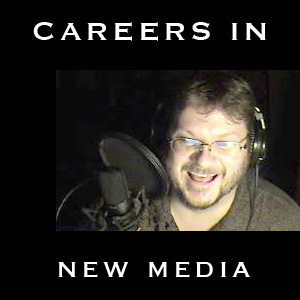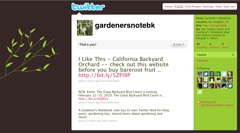Sitting at a friend’s Canadian Thanksgiving celebration on Sunday I had a huge epiphany about new media. As we sat around talking about all sorts of things. Twitter, Facebook and blogging came up as they often do these days. Of course, as usually happens, I spent a lot of time explaining new media, addressing people’s fears and correcting their misconceptions about what New Media is and how New Media tools can and should be used. This is when it struck me — I am re-living my career.
Back in 1982 I was doing much the same thing. I was explaining to people how PCs worked, what you could and should do with them and why you needn’t be afraid. We are all repeating the PC revolution with a series of new tools, new concepts and new realities. Everything old is new again.
Now that I recognize this fact, I am going to be focusing my New Media efforts in many new and different ways, but also many that are very similar to 1986.
Technology is not just for the techie
First, as I have been preaching for years, technology is not just for the techies. Sure, we might be the first to adopt these tools, but that doesn’t mean that they are beyond the grasp of the average person. In fact, it is when technology gets into the hands of the mainstream that its true power is seen. That was true for PCs and it is true for New Media. Even more, New Media and Social Media have inherent qualities that go beyond the basic technological functions of computers in general. The global effects of services like Twitter, Facebook, Video Conferencing, Podcasting and others, make the PC revolution look like the stone age. The changes we will see in the coming years will be beyond even our own wildest dreams.
Not my job to convince you
Second, it is NOT my job to convince you to use New Media. You have to come to that decision on your own. I can help you understand New Media. I can help you understand the technology. I can help you understand and develop ways to make it work for you and your business. Trying to convince a skeptic, though, is uncomfortable for both of us and very rarely works. I believe that New Media, just like a PC, is an amazing tool that can help you to accomplish great things, but if you see it only as a toy or even worse, an annoyance, then any further evangelizing on my part becomes the proverbial “teaching a pig to sing.”
Too many misconceptions
In talking with a wide variety of people, I hear the same phrases over and over. “Twitter is nothing but narcissistic people telling you what they had for lunch. Facebook is nothing but narcissistic people throwing snowballs, or pies or other stupid, time-wasting applications. Blogging is nothing but narcissistic people ranting about whatever they feel like.” While these things are certainly part of New Media, they are far from the sum total.
When I talk with people and explain how they can use New Media to improve their lives, their careers and their businesses and not just discuss their lunch, their eyes open. The preconceptions drop away and they see the many direct ways that blogs, Facebook, Twitter or other services can directly assist them in achieving their immediate goals. We just have to get beyond the preconceptions served up by the mainstream media and fearful people who just wish it would simply go away and start talking about the reality of New Media. Don’t let the preconceptions of others keep you away from learning about and eventually using these amazing tools.
Don’t be overwhelmed
Also, don’t be overwhelmed by the tools. The truth is, too many people turn on the New Media spigot — with a Facebook account or Twitter stream — and are quickly buried by the “firehose” of information. It doesn’t have to be that way. Out of simple self-preservation, you need to proceed slowly and tread lightly. Don’t “friend” people promiscuously just because they ask. Evaluate each of your contacts, just like you would in normal business life, and see if they (and their information) holds value for you. If so, friend them back or follow them on Twitter if that’s where you first make contact. Never feel beholden to give attention to someone who doesn’t deserve it, no matter who they are. If you protect your attention from the start, you will have a much more enjoyable and productive New Media existence.
The power of New Media is in the doing
It is hard to see how you might use New Media until you actually starting doing it. Once begun, it develops its own momentum. It creates a new sense of direction. Once you begin using New Media tools you quickly start to see other ways you can apply them. You can’t stand outside New Media and hope to understand it. You have to get on and ride. Only then will you truly know what it can do for you.
I Believe!
In case you can’t tell, I believe in the power of New Media, just as I believed in the power of the PC so many years ago. New Media has the power to help us grow our lives, our careers and businesses in some amazing ways. I believe in New Media so much that I have developed many ways to show people just how powerful it can be.
First, this blog, Careers in New Media, seeks to give you great New Media examples and advice. Everything from the theoretical reasons you might use New Media to hands-on “Real World Examples” and “New Media Prescriptions” to get you started.
Second, I founded the free group New Media Interchange (NMI) to bring the power of New Media to EVERYONE! At NMI we have a blog, a mailing list and a community site where you can ask your New Media questions and learn how to integrate it into your life. A few months ago, NMI presented “From Camera to YouTube” at the Writer’s Guild of America West, a 2-hour presentation showing WGA and NMI members the path to delivering their creative work via the Internet.
Third, I speak on New Media whenever and wherever I can. On November 14 and 15, 2009, I will be speaking at
PodCampAZ in Phoenix, Arizona. I consider this free, 2-day unconference the premiere New Media conference in the Southwest and arguably the US. I would love to speak to your group if they have a desire to learn more about New Media. I also teach
an online course at UCLA Extension entitled New Media and Podcasting for Writers.
Finally, I consult professionally on New Media in a variety of ways. On an individual or company basis, I help start blogs, record podcasts and develop social media campaigns with hands-on, direct consulting both in-person and via the Internet. I am also in the process of creating a mastermind group, New Media Mastermind, where committed people can come together each month and help each other get the most out of New Media. Sometimes, I just talk to people, as I described above and help them to see just how important New Media can be.
If you want to know more about New Media, visit any of the sites above, join New Media Interchange and visit our community site, hire me to coach you through your initial forays into New Media, email me at douglas@welchwrite.com or contact me on Twitter, Facebook, or on my blog, Careers in New Media.



 While attending an online course today via streaming video, I was struck with a problem that I hadn’t really thought about before. In classes where there is a large amount of prep work — installing several software packages, checking connections, trying a sample project — the first session can be quite daunting. Students are eager to dive into the topic and start working with the tools or information. If, instead, they are presented with an hour or more of setup, you are likely to lose them before you ever get started. I know for myself, today’s class seemed interminable. In fact, they may have lost me for the rest of the class. I will probably give it one more try, but if it isn’t significantly better, I will probably abandon the class in favor of more self-directed learning through others sources.
While attending an online course today via streaming video, I was struck with a problem that I hadn’t really thought about before. In classes where there is a large amount of prep work — installing several software packages, checking connections, trying a sample project — the first session can be quite daunting. Students are eager to dive into the topic and start working with the tools or information. If, instead, they are presented with an hour or more of setup, you are likely to lose them before you ever get started. I know for myself, today’s class seemed interminable. In fact, they may have lost me for the rest of the class. I will probably give it one more try, but if it isn’t significantly better, I will probably abandon the class in favor of more self-directed learning through others sources. Over the last couple of weeks, I have been asked this question more than a few times, both face-to-face and via email/Twitter. The on-going privacy policy battles with Facebook have turned off a lot of people on the large (and growing larger) service, but for the foreseeable future, if you leave Facebook, you might just be reducing your social media effectiveness.
Over the last couple of weeks, I have been asked this question more than a few times, both face-to-face and via email/Twitter. The on-going privacy policy battles with Facebook have turned off a lot of people on the large (and growing larger) service, but for the foreseeable future, if you leave Facebook, you might just be reducing your social media effectiveness.

 I received an interesting message today from a fellow LA Tech traveler. She hosts a major event but was getting some push back on the advertising poster that was designed and released. She asked a couple of questions about how she might deal with this push back and turn it around into something positive.
I received an interesting message today from a fellow LA Tech traveler. She hosts a major event but was getting some push back on the advertising poster that was designed and released. She asked a couple of questions about how she might deal with this push back and turn it around into something positive.

![Reblog this post [with Zemanta]](http://img.zemanta.com/reblog_e.png?x-id=c97b63b4-3d37-4c9a-9112-d52da78c97d1)